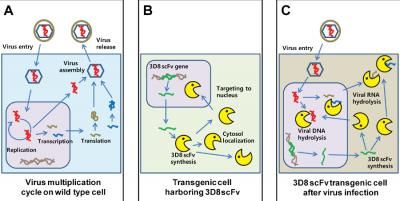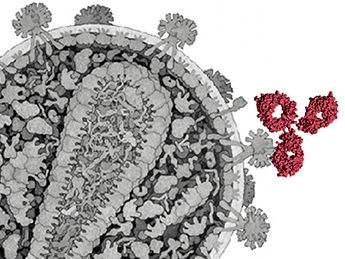A mini-antibody with broad antiviral activity chews up viral DNA and RNA
Advertisement
antibodies and their derivatives can protect plants and animals - including humans - against viruses. Members of this class of drugs are usually highly specific against components of a particular virus, and mutations in the virus that change these components can make them ineffective. An article in PLOS Pathogens now reports that a mini antibody called 3D8 scFv can degrade (or chew up) viral DNA and RNA regardless of specific sequences and protect mammalian cells and genetically manipulated mice against different viruses.

3D8 scFv with broad antiviral activity has a unique stereoscopic protection mechanism such as a DNA digestion activity in nucleus and RNA hydrolysis activity in cytoplasm. 3D8 scFv proteins can chew up viral DNA or viral RNA at two different places and stages.
Sukchan Lee and colleagues, CC-BY
Sukchan Lee, from Sungkyunkwan University, Suwon, Korea, and colleagues had previously discovered that 3D8 has both DNase and RNase activity (that is, it can degrade both), and that it can inhibit viruses under certain circumstances. In this study, they genetically manipulated cells and mice to produce 3D8.
They show that when the right amount of 3D8 is produced, the cells and the animals become resistant to two different and normally deadly viruses, namely herpes simplex virus and pseudorabies virus. To protect the animals, it appears critical that the right dose of 3D8 is present in the tissues initially infected by the viruses; once the virus has started to multiply and spread, it seems that 3D8 can no longer contain it efficiently.
When the researchers examined the mechanisms underlying the protective activity, they found that 3D8 fights viruses at two different places and stages of the viral life cycle. In the cell nucleus, it degrades viral DNA to prevent it from getting copied. In the cytoplasm (the area outside of the nucleus), it destroys RNA destined to be used for the production of virus components.
As the researchers discuss, the correct 3D8 dose is critical to destroy only viral DNA and RNA (but not their host genetic material), and additional research is needed to understand the basis for this selective activity. Moreover, to protect the host, 3D8 needs to be present at the time of viral infection and in the right tissues. That said, they conclude that "3D8 scFv is a candidate antiviral protein that can potentially confer resistance to a broad spectrum of animal and plant viruses". They also suggest that "this strategy may facilitate control of...viruses uncharacterized at the molecular level, regardless of their genome type or variations in gene products".
Original publication
Other news from the department science
Most read news
More news from our other portals
See the theme worlds for related content
Topic world Antibodies
Antibodies are specialized molecules of our immune system that can specifically recognize and neutralize pathogens or foreign substances. Antibody research in biotech and pharma has recognized this natural defense potential and is working intensively to make it therapeutically useful. From monoclonal antibodies used against cancer or autoimmune diseases to antibody-drug conjugates that specifically transport drugs to disease cells - the possibilities are enormous

Topic world Antibodies
Antibodies are specialized molecules of our immune system that can specifically recognize and neutralize pathogens or foreign substances. Antibody research in biotech and pharma has recognized this natural defense potential and is working intensively to make it therapeutically useful. From monoclonal antibodies used against cancer or autoimmune diseases to antibody-drug conjugates that specifically transport drugs to disease cells - the possibilities are enormous





















































